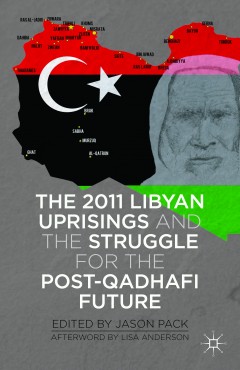Tripoli, 1 September 2013:
A new book on the Libyan . . .[restrict]revolution and events since was launched in Libya on Wednesday evening at the former Jihad Hall next to Tripoli’s central cemetery by Jason Pack, an American academic specialising in Libyan history and politics and who is currently a researcher of Libyan History at the University of Cambridge.
The 2011 Libya Uprisings and the Struggle for the Post-Qadhafi Future, edited by Pack, contains chapters by a number of academics – American, British, German and Libyan. It has been called the “best Libya book since the uprising against the Qaddafi regime” by David Mack, a former US diplomat who served as a political officer at the US embassy in Tripoli when Qaddafi seized power. It has received numerous plaudits from other reviewers.
Nate Mason, who served as Commercial Attaché at the US embassy until earlier this year has reviewed the book.
Libyans suffered for 42 years under one of the most capricious and idiosyncratic dictatorships in recent history. The “Jamahiriya”, or State of the Masses, instituted by Muammar Qaddafi actively sought to undermine its own state institutions in the name of ‘direct governance by the people’ while maintaining the fiction that Qaddafi, the so-called Brother Leader and Guide of the Revolution, was not actually running the country according to his whims. Given the decades of double speak and parallel power structures they have experienced, it is not surprising how difficult it is for Libyans to decide how to govern themselves in the aftermath of the revolution. A deep distrust of central authority sits uneasily alongside the expectations of perennial government welfare that 42 years of living in a rentier state have ingrained.
In a new edited volume, The 2011 Libyan Uprisings and The Struggle for the Post-Qadhafi Future (published June 2013 by Palgrave Macmillan), Jason Pack describes this tension as a struggle between the ‘center’ and the ‘periphery’. It is a useful prism through which to view the events surrounding the revolution, and it remains very much an open question which of the two will dominate post-revolution Libya. Pack, a researcher at Cambridge University, is in a favourable position to assess events in the new Libya having worked in the country in both the Qaddafi and post-Qaddafi times and having interacted with the country in a variety of different roles such as academic, consultant, and journalist. His book draws on his personal experiences – as well as that of other leading practitioners, such as former British Ambassador to Libya Richard Northern – and marshalls it to examine key dynamics and actors connected with the revolution in an effort to elucidate how they affect the struggle between the center and the periphery while wisely avoiding most temptations to prognosticate about the future.
Central to the uncertainty that defines post-revolution Libya is a lack of consensus about what the new Libya should look like. George Joffé opens the book by describing the relentless efforts of the Qadfafi regime to destroy any group or even organising principle that might compete with his Green Book and cult of personality. Religious, tribal, labour, political and charity groups were systematically suppressed or co-opted. The suppression of any identities outside of the Jamahirya was so pervasive that Libyan soccer players, except for Qadfafi’s son who played on one of the teams, were forced to be called only by their numbers; movie theatres remain almost entirely absent from Libya; Libyans’ ability to gather in large groups was limited to activities like the Basic People’s’ Congresses that existed purely to fuel the regime’s mythology.
Ronald Bruce St John’s overview of the Libyan economy provides another fundamental insight into why Libyans agree so little about the future of their country. Most Libyans have only experienced the rentier petro-state that Libya is today. As much as they resent the former regime’s control over their lives, they expect the new central government to provide them with jobs, subsidise their gasoline and food, and deliver necessities like housing. This expectation of state provision of basic needs intertwines the discussion of Libya’s future with how the spoils from the oil should be divided. In this context, democracy can be viewed as a cynical ploy to rationalise the economic empowerment of tribes that largely supported the revolution at the expense of those perceived to have been pro-regime. The disqualification of numerous elected Tebu and Tuareg representatives due to alleged ties to the old regime certainly fed this suspicion among those groups. Privatisation and market economics can also be used as a cover to shift state assets to favoured tribes, regions, or cities. This type of suspicion makes consensus elusive on even seemingly basic governance issues.
Several chapters discuss aspects of the role and position of the tribes in Libya before and after the revolution. This may be the most valuable aspect of the book to most readers, not only due to its scholarship, but because it is harder to find than most information on Libya. The authors describe how Qaddafi tried to suppress tribalism and then to co-opt it. The tribes can be seen as the most powerful expression of the periphery while the centers of power such as Tripoli are largely de-tribalised. The tribes endured Qaddafi, but the qualities that have allowed them to facilitate the tenuous stability existent in Libya since the revolution are an obstacle to the formation of a credible centre. Numerous passages describe the often personalised approaches tribal leaders take to resolve disputes or cajole other tribal leaders. This case-by-case approach to decision-making and negotiation is directly at odds with the dispassionate, systematic approach expected of the government in its central roles of dispensing the oil revenue and guaranteeing justice.
Southern Libya presents one of the most direct challenges to the centre. Not only is it physically peripheral, but it has always remained outside of the centre’s direct control. It also features the most immediate and clear conflict over what it means to be Libyan. Are the Tebu and Tuareg Libyan? Do they deserve equal status under the law with the Arab majority or are they foreigners to be expelled? Henry Smith provides a wealth of details about the various tribes and minorities in the south and their relationships. He details how the institutions of the central government are not impartial. For example, the interference in inter-tribal violence in the south by a brigade theoretically loyal to the federal government actually reinforced tribal actors rather than showcasing the authority of the centre.
The books ends with a discussion of the Islamists, certain factions of which are arguably the most intransigent peripheral element, totally rejecting the centre, tribes, mainstream Libyan religious traditions, and in some cases even the idea of a Libyan state distinct from an aspirational Islamic Caliphate. The authors provide a clear description of the four main Islamist factions: the Libyan Islamic Movement for Change, the Muslim Brotherhood, assorted Salafists, and freelance jihadists. Only the last two groups have shown a willingness and desire to play the spoiler in post-revolution Libya, but absent effective security forces, they have been fairly successful despite a dearth of public support. It remains to be seen whether public demand for law and order in the wake of their widely vilified attacks on foreigners, Sufi shrines and other targets can be fulfilled by the tribes or the central government.
This question comes back to what it means to be Libyan. Is Libya a collection of tribes that cycle through power with the old tribal configurations from the Senussi era now returning to the fore? Or is Libya a collection of individuals with resources and justice dispensed primarily according to the law? Or is Libya really three countries confederated into one? Or is it an Islamic Emirate? The resolution of the tug-of-war between the centre and the periphery will come down to what Libyans decide and which groups have the power to implement their desires. Jason Pack’s The 2011 Libyan Uprisings and The Struggle for the Post-Qadhafi Future is an excellent book that will give readers the context to follow the choices as Libyans make them.
[/restrict]










